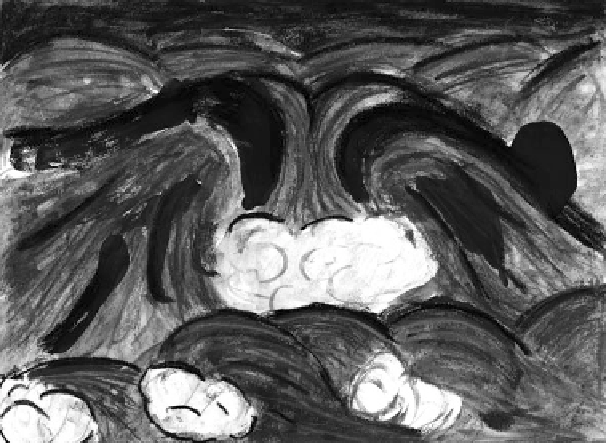Geoscience Reference
In-Depth Information
Fig. 1.1
''All the sheep!''
Child's impression of a large
tsunami breaking on a rocky
coast at night. Kate Bryant,
1998
Sydney, Los Angeles, Tokyo, Honolulu, Chennai (formerly
Madras), or any of a dozen other large cities, the death toll
would be in the tens of thousands. A geological clock is also
ticking away that eventually will see the occurrence of a
tsunami as large as the Indian Ocean event of 2004 off the
coast of Portugal, the northwest coast of the United States,
or in the Caribbean. This topic describes tsunami as an
underrated hazard and summarizes some of these recent
discoveries. It presents a comprehensive coverage of the
tsunami threat to the world's coastline.
in fear. The sky was falling. Smaller stars continued to fall
throughout the night with great clamoring and smoke. The
next morning when all was quiet again only the bravest
hunters explored beyond the campsite. Great holes were
burnt into the ground. Wherever one of the larger molten
pieces had hit, it had piled up large mounds of soil. Many of
these holes were still burning with flames belching out.
Down by the sea, they were amazed. Fresh caves lined the
cliffs.
Soon stories reached them from neighboring tribes that
not only had the sky fallen, but also the ocean (Peck
1938
).
These neighbours began talking about a great ancestor who
had left the Earth and gone into the sky, and who had
travelled so fast that he had shot through the sky. The hole
he had made had closed up. This ancestor had tried to get
back through the sky by beating on top of it, but it had
loosened and plummeted to the Earth, along with the ocean.
Before anyone could discuss this story, it began to rain—
rain unlike anything anyone had seen before. It rained all
day and all night, and the rivers reached their banks and
then crept out across the floodplains. Still the rain came
down, and the people and all the animals fled into the hills.
When the water rose into the hills, the people fled to the
highest peaks. Water covered the whole land from horizon-
to-horizon unlike anything anyone had ever seen before. It
took weeks for the water to go down, everyone got very
hungry, and many people died. Nothing was the same after
the night that the sky fell. Now, whenever the sea grows
rough and the wind blows, people know that the ocean is
angry and impatient because the ancestor still refuses to let
it go back whence it came. When the storm waves break on
the beach, people know that it is just the great ancestor
beating the ocean down again.
1.2
Five Stories
1.2.1
An Aboriginal Legend
It was a stifling hot day, and all the Burragorang people lay
prostrate around their camp unable to eat (Parker
1978
). As
night approached, no one could sleep because of the heat
and the mosquitoes. The sun set blood red and the moon
rose full in the east through the haze. With just a remnant of
red in the western sky, the sky suddenly heaved, billowed,
tumbled, and then tottered before crumbling. The moon
rocked, the stars clattered, and the Milky Way split. Many
of the stars—loosened from their places—began to fall
flashing to the ground. Then a huge ball of burning blue fire
shot through the sky at enormous speed. A hissing sound
filled the air, and the whole sky lit like day. Then the star hit
the Earth. The ground heaved and split open. Stones flew up
accompanied by masses of earth followed by a deafening
roar that echoed through the hills before filling the world
with complete noise. A million pieces of molten fire
showered the ground. Everyone was awestruck and frozen


